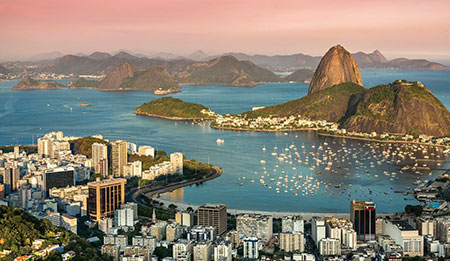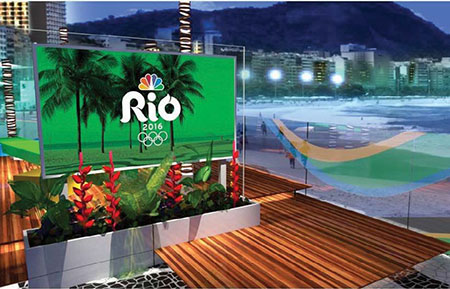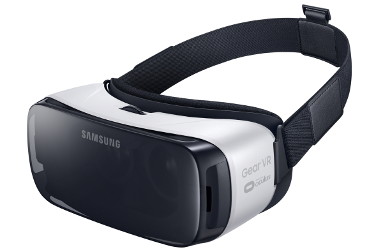Rio: The Immersive Summer Games

RIO DE JANIERO—Twenty years ago, NBC connected its 30 Rock facility to the International Broadcast Center at the Centennial Olympic Games in Atlanta via T3 lines.
The groundbreaking “virtual IBC”—as it was called at the time— was the beginning of a remote production workflow that got its additional spark when file-based and IT/IP technology became available, and the cost of bandwidth decreased.
At the last two Summer Games in Beijing and London, NBC was able to keep a substantial amount of crew and equipment at existing U.S.- based facilities. Staying “@home,” as the program was called, became a logistical and cost-containment necessity when producing what has become an ever-increasing volume of content.
‘UNPRECEDENTED VOLUME’
Like its predecessors in London and Beijing, NBC’s coverage of the Games of the XXXI Olympiad from Brazil’s second most populous city, August 5–21, will yield an “unprecedented” volume of content.

Dave Mazza
“It’s daunting,” said David Mazza, CTO and senior vice president, NBC Sports Group & Olympics. “The scale of the Rio production is off the charts. We are building on everything that was successful in London, yet with more of it: more hours, more live streaming, more circuits, significantly more social media, more mobile, some new virtual, more high speed, new VR, new 4K HDR, and much more @home production and activity.”
The anticipated numbers for NBC’s coverage of the Rio Games are staggering. The networks and digital platforms of NBCUniversal will present an unprecedented 6,755 hours of programming.
Get the TV Tech Newsletter
The professional video industry's #1 source for news, trends and product and tech information. Sign up below.
The number of produced hours of broadcast coverage is 1,537, up from 1,306 in London. Replays across all dayparts are up from 496 to 648 hours. Like London, everything coming from host broadcaster OBS is being streamed live on both web and mobile— approximately 4,700 hours. Binge-watching all of NBC’s Olympic coverage from Brazil would be a 24/7, 286-day endeavour. Beyond that, this also will be the “most live Olympics ever,” in the U.S. as Rio is just one hour ahead of EST. NBC will broadcast about 260 hours in primetime, which will mostly be 8 p.m.–midnight, ET/PT. Additional programming will take place throughout the day.

STAYING @HOME
The Rio @home effort builds a lot on the two most recent Summer Games, which relied on 30 Rock and other NBC facilities in the U.S. (Although the then newly built Stamford, Conn., NBC Sports Group complex— home to NBC Sports, NBC Olympics and the NBC Sports Network—was used for an @home effort for the Sochi Winter Games in 2014, Rio will be its first Summer Games.)
The Stamford Olympic contingent will be more than 50 percent larger than the prior two Summer @home efforts, with about 1,100 staffers scheduled to be on-site. Coverage for seven cable shows will originate in part from Stamford: NBCSN, MSNBC, CNBC, USA, BRAVO, Soccer, and Basketball Specialty Channels. In addition, some web/mobile-only shows will also be produced from Connecticut.
For this massive undertaking, the site has seven control rooms ready for Olympics use, along with a mobile unit parked at the loading dock. Eighteen announce booths will be used at the facility where announcers will call competitions from monitors. Some 80 people in the “Highlights Factory” will produce clips-based content.
The facility will also hold close to 100 digital stream monitors and ad inserters, the bulk of the digital content gathering staff, a portion of the broadcast graphics and editing staff, and three Pro Tools rooms.
“We couldn’t do this without a massive effort in Stamford,” said Tim Canary, vice president of engineering for NBC Sports Group. He said that for each control room in Stamford, that’s 30-50 people who don’t have to be flown to Rio and housed there.
One bit of the existing Stamford facility that will see its Olympics debut is a relatively new Evertz EXE IP routing system, installed about a year ago when the facility started to outgrow its 1152x1152 baseband router.
“We decided to put an IP router in for monitoring, but it quickly grew to being used on-air,” said Canary. “We’re using IP-wrapped HD-SDI uncompressed in the Aspen format. We now have the capacity we need, and we’re more prepared for 4K and IP-based production in the future.”
Connectivity from Brazil to Stamford and other NBC facilities in the U.S. will be via four 10Gig fibers, on three distinct paths. This actually means 20Gigs of useable bandwidth, as two of the four lines are for backup, which is also provided by a 45Mbps satellite circuit. More than 130 HD paths in MPEG, JPEG2000 and IP HD formats will flow from Rio.
The NBC Olympics MAM, mostly housed in Stamford, has become the core of all filebased production activity whether in Rio or stateside. Harmonic MediaDeck media servers are key here, simultaneously recording as many as 60 incoming venue feeds as both XDCAM-HD at 50 Mbps and H.264 low-resolution proxy. Each recording’s proxy will be replicated in near real-time on a 960 TB Harmonic MediaGrid storage system connected via the 10 Gig circuits to a second 920 TB MediaGrid installed in Stamford. Integration of the MediaGrid system into NBC’s EVS server workflows, with EVS IP-Director devices directly mounted on the MediaGrid, will extend and pool the storage capabilities of the EVS systems. From any IP-Director seat, NBC Olympics personnel will have immediate access to footage from any venue, from any day of competition.
Like Sochi, Rio will be an Olympics without a traditional record wall. EVS XT servers have become the mainstay for all replays and quick turnaround content, the MAM’s Media Decks and Media Grid have taken over record and ingest duties, and more heavily edited content can access Avid storage. The MAM is now running a new Media Central Interface from Avid that bridges the gap between the NBC Olympics PAM (formerly Interplay) and the broader MAM.

NBC will host much of its Olympics coverage from this outside venue at Copacabana Beach.
VR AND 4K HDR
Rio will be remembered as the first Olympics with limited virtual reality production, courtesy of the heavy (production) lifting of host broadcaster Olympic Broadcasting Services (OBS). NBC Olympics will offer VR coverage on one day delay to authenticated users of compatible Samsung Galaxy smartphones together with the Samsung Gear VR headset, via the NBC Sports app. The 85 hours of VR programming will include the Opening and Closing Ceremonies, men’s basketball, gymnastics, track and field, beach volleyball, diving, boxing, and fencing, as well as highlight packages of those sports.
NBC Olympics’ coverage will include the distribution of 4K Ultra HD coverage to cable, satellite, telco providers, and other partners for the first time, also on one-day delay. This coverage will include footage from the Opening and Closing Ceremonies, swimming, track and field, basketball, the men’s soccer final, and judo, as well as Rio scenics.
The content will be produced by OBS and Japan’s NHK, and is downconverted from the latter’s 8K capture. NBC will be going a step further at the opening ceremonies, using HDR-ready Sony HDC-4300 cameras and Canon 4K lenses to capture HDR content as well.

NBC Olympics will offer VR coverage on one day delay to authenticated users of compatible Samsung Galaxy smartphones together with the Samsung Gear VR headset, via the NBC Sports app.
Sony’s HDC-4300 4K high frame rate cameras will also be used for HD replays, while Sony’s PWS-4500 XAVC server will be used to capture and store this content. This kit joins a total of more than 100 Sony cameras NBC will use in Rio in studio and portable applications. Several Sony MVS switchers—including the MVS-7000X series—will handle feeds coming from venues and also originate HD cable coverage.
In the category of “what viewers will notice,” Mazza was quick to credit OBS with driving specialty camera coverage forward. The host is deploying more XMO high speed cameras, more POVs than ever before, seven Sky Cams, and new in Rio mini-tracking cameras.
Viewers will also hear more Surround Sound than ever before, with Surround now available across all cable network coverage. Dolby Atmos 5.1.4 capture will also be a part of the HDR capture, and more and more MADI routing and IP audio networking will be seen.
UNSEEN BUT CRITICAL NONETHELESS
Not noticeable for the home viewer, but critical for any larger 4K future, is the near-complete transition from copper to fiber in NBC’s International Broadcast Center (IBC) and the host rooms. Both NBC and OBS have finished this infrastructure conversion since the Sochi Games, and the payoffs go beyond more bandwidth. It also means less weight, a quicker install and, for NBC, real cost savings related to the decrease in cable trays. NBC upgraded all of its IBC frame syncs to the newest GVG XVP units along GVG’s LUMO fiber product line.
Also not flashy but very critical moving forward is a revamp of the router control system from units that had been in use since 1999 to a new Lawo VSM, which will serve as the overall control system for all core routing and tally management. It’s a format-agnostic and matrix-agnostic system that should see years of use according to Mazza.
Rio will also see the most significant upgrade of the comms infrastructure in years, with NBC employing RTS equipment that now includes Omneo IP networking, RVON, IP Trunking, an ADAM intercom Matrix and intercom panels.
Remote venue production continues to be refined and expanded, with @home or IBC-based control rooms able to control small production router or commentary positions through a web interface. New this year is the use of EVS’ MultiReview system in an editing application to control diving venue EVS recorders from the IBC. “In theory this could be done from anywhere,” said Mazza. A ‘Collaborative off-tube’ commentary design with commentators in Brazil and in Stamford will also debut.
The Secondary Audio Program (SAP) will be used more than ever before with Rio seeing the first use of descriptive audio by NBC at an Olympics.
This will also mark the first time since Barcelona in 1992 that NBC will have a big studio outside the IBC. Both the daytime and late night shows will make use of a large studio complex on Rio’s beautiful Copacabana Beach.
As for all the press reports coming out of Rio in the months and weeks before the Games, Mazza said that things are actually going better than is often reported.

